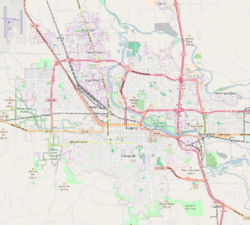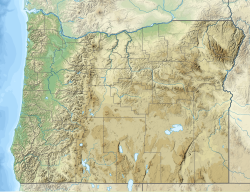Matthew Knight Arena
MKA | |
 | |
 The exterior of the arena | |
| Location | 1390 Villard St.[1] Eugene, OR 97401 United States |
|---|---|
| Coordinates | 44°02′42″N 123°03′58″W / 44.045°N 123.066°W |
| Public transit | EmX Agate Station |
| Owner | National Championship Properties (subsidiary of University of Oregon) |
| Operator | Arena Network |
| Capacity | 12,364 |
| Construction | |
| Broke ground | February 7, 2009 |
| Opened | January 13, 2011 |
| Construction cost | $227 million ($317 million in 2024 dollars[2]) |
| Architect | TVA Architects Ellerbe Becket[3] |
| Structural engineer | Haris Engineering, Inc.[3] |
| Services engineer | Henderson Engineers Inc.[3] |
| General contractor | Hoffman Construction Company |
| Tenants | |
| Oregon Men's Basketball (NCAA) (2011–present) Oregon Women's Basketball (NCAA) (2011–present) Oregon Volleyball (NCAA) (2011–present) Oregon Acrobatics & Tumbling (NCATA) (2011–present) | |
The Matthew Knight Arena (MKA) is a 12,364-seat, multi-purpose arena in Eugene, Oregon, United States. It is home of the Oregon Ducks men's & women's basketball teams, along with the volleyball team, replacing McArthur Court. All teams compete in the Big Ten Conference starting with the 2024-25 season after their time as members of the Pac-12 Conference. It is located on the east side of campus at the corner of Franklin Boulevard and Villard Street, a gateway to campus as people arrive from I-5. The arena was originally intended to be ready for the start of the 2010–11 basketball season, but instead opened for the men's basketball game against the USC Trojans on January 13, 2011.[4] It is named for chief donor Phil Knight's son, Matthew Knight, who died aged 34 in a scuba diving accident.[5] The arena cost $227 million[6] and was designed as collaboration between TVA Architects of Portland and Ellerbe Becket of Kansas City, Missouri. Hoffman Construction Company of Portland was the general contractor.[7]
The Ducks inaugurated the arena to a sold-out crowd on January 13, 2011, beating the USC Trojans, 68–62.[8]
Design
[edit]
The arena floor is named Kilkenny Floor after former Oregon Athletic Director Pat Kilkenny. Called "Deep in the Woods", the design features repeating silhouettes of Pacific Northwest tree lines, giving the impression of being lost in the forest, gazing toward the sky. The floor was designed by Tinker Hatfield, Nike's VP of Creative Design, who intended to design an "iconic television presence possible for the University of Oregon" and honor the "Tall Firs", the nickname of the 1938–39 Oregon Ducks men's basketball team, winners of the inaugural NCAA basketball championship.[9][10]
The arena also features a 32-by-36-foot (9.8 m × 11.0 m), 65,000-pound (29,000 kg) center-hung scoreboard, once the largest in college sports. It contains four 20-by-12-foot (6.1 m × 3.7 m) HD LED monitors and is connected to the ceiling by intersecting "O" logos.[11]
There was some criticism from fans about the glare caused by the court's contrast. There also was criticism for the lack of a visible center court line,[12] though one has since been added.
Criticism
[edit]Statewide criticism
[edit]The projected construction cost of $200 million made Knight Arena the most expensive on-campus basketball arena in the United States, and financing was secured through state-backed, 30-year bonds.[1] The university was criticized for overstating the income estimates.[13]
Community criticism
[edit]There was also concern from residents of the Fairmount neighborhood, where the arena is located, about insufficient parking and trash disposal during events.[14] According to spokesman Greg Rikhoff, the university did not originally plan to add any new parking for the 12,500-seat arena. The first proposals included only street parking and a remote park and ride shuttle service for spectators, but later proposals added parking spaces. The university was required to obtain a conditional use permit, obligating the university to provide a transportation plan, a community impact statement, and to address other neighborhood concerns about the new use of the property in an open forum.[4][15]
On-campus criticism
[edit]Students expressed concern about the proximity of the planned arena to on-campus student housing, listing site-specific concerns such as physical security, noise, and "the out-of-place scale" of building in an academically focused residential area.[16]
Sellout games
[edit]| Opponent | Attendance | Year | |
|---|---|---|---|
| 1 | Oregon State | 12,369 | 2010–11 |
| 2 | USC* | 12,364 | 2010–11 |
| 3 | Stanford | 12,364 | 2010–11 |
| 4 | Stanford | 12,364 | 2012–13 |
| 5 | Washington | 12,364 | 2012–13 |
| 6 | Arizona | 12,364 | 2013–14 |
| 7 | Army | 12,364 | 2016–17 |
| 8 | UCLA | 12,364 | 2016–17 |
| 9 | Oregon State | 12,364 | 2016–17 |
| 10 | Stanford | 12,364 | 2016–17 |
| 11 | Arizona | 12,364 | 2016–17 |
| 12 | Utah | 12,364 | 2016–17 |
| 13 | UCLA | 12,364 | 2017–18 |
| 14 | Oregon State | 12,364 | 2017–18 |
| 15 | Oregon State | 12,364 | 2018–19 |
| 16 | Oregon State | 12,364 | 2019–20 |
| 17 | Arizona State | 12,364 | 2019–20 |
| 18 | Washington State | 12,364 | 2019–20 |
| 19 | Washington | 12,364 | 2019–20 |
(*) Opening night at Matthew Knight Arena
Women's games in italics
See also
[edit]References
[edit]- ^ "Ticket Sales - Matthew Knight Arena, Eugene Oregon Concerts and Events". www.MatthewKnightArena.com. Archived from the original on October 25, 2010. Retrieved December 24, 2017.
- ^ 1634–1699: McCusker, J. J. (1997). How Much Is That in Real Money? A Historical Price Index for Use as a Deflator of Money Values in the Economy of the United States: Addenda et Corrigenda (PDF). American Antiquarian Society. 1700–1799: McCusker, J. J. (1992). How Much Is That in Real Money? A Historical Price Index for Use as a Deflator of Money Values in the Economy of the United States (PDF). American Antiquarian Society. 1800–present: Federal Reserve Bank of Minneapolis. "Consumer Price Index (estimate) 1800–". Retrieved February 29, 2024.
- ^ a b c "University of Oregon, Matthew Knight Arena". Ellerbe Becket. Archived from the original on January 22, 2013. Retrieved November 13, 2013.
- ^ a b "Matthew Knight Arena Ready for Debut". KMTR. Eugene. January 13, 2011. Archived from the original on July 27, 2011. Retrieved January 13, 2011.
- ^ Bachman, Rachel (December 13, 2008). "Knight Appears, Announces Name of Arena". The Oregonian. Portland, OR. Retrieved May 21, 2011.
- ^ Beseda, Jim (January 13, 2011). "For Ducks, a Change of Venue". The Oregonian. Portland, OR.
- ^ Hunt, John (January 22, 2008). "New-Look Arena". The Oregonian. Portland, OR. Retrieved November 13, 2013.
- ^ Clark, Lucas (January 14, 2011). "Ducks Christen Knight Arena with Surprising Victory". Oregon Daily Emerald. University of Oregon. Archived from the original on January 17, 2011. Retrieved January 14, 2011.
- ^ Gardner, Tim (November 8, 2010). "Oregon's New Basketball Court Isn't Just Wood, It's Art". USA Today. Retrieved November 8, 2010.
- ^ Davis, Glenn (November 6, 2010). "University of Oregon's New Basketball Court Will Leave You Speechless". SportsGrid. Retrieved November 8, 2010.
- ^ Holmes, Baxter (January 12, 2011). "Trojans Get to Break in Oregon's New Arena". Los Angeles Times. Retrieved September 13, 2011.
- ^ Eisenberg, Jeff (January 14, 2011). "Distracting Glare Detracts from First Game at Oregon's New Arena". Yahoo! Sports. Retrieved September 13, 2011.
- ^ Knutson, Ryan (February 11, 2008). "Arena Report Shows Early Skepticism". Oregon Daily Emerald. University of Oregon. Retrieved November 13, 2013.
- ^ Knutson, Ryan (January 30, 2008). "Arena Project Raises Concern in Community". Oregon Daily Emerald. University of Oregon. Retrieved November 13, 2013.
- ^ "UO Needs City OK on New Arena". KVAL. Eugene. Associated Press. June 4, 2008. Retrieved January 13, 2010.
- ^ "Arena Resolution". University of Oregon Residence Hall Association. January 24, 2008. Archived from the original on June 24, 2010. Retrieved January 13, 2010.




